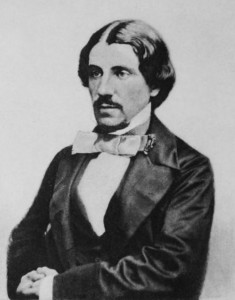 Born in County Donegal in 1824, Irishman William Allingham was a poet and scholar who was best known for his Diary that was published after his death. He wrote a large number of verses and his poem The Faeries has been included in many anthologies over the years.
Born in County Donegal in 1824, Irishman William Allingham was a poet and scholar who was best known for his Diary that was published after his death. He wrote a large number of verses and his poem The Faeries has been included in many anthologies over the years.
His father was a bank manager, English by birth, and Allingham was brought up in comfortable surroundings. He was just nine years old though when his mother died suddenly. When he came of age he took a post with the government at a custom-house, something he continued to do in both his native Ireland and England well into his late forties.
At the same time he was beginning to write poetry and published his first collection Poems in 1850 which contained his most famous work The Faeries. It is an often quoted poem having appeared in a number of well-known films including at the beginning of Willy Wonka and the Chocolate Factory. Although often considered to be aimed at children, the poem has sinister undertones and was no doubt prompted by the wild countryside and legends of his home town of Ballyshannon.

Allingham became friends with the likes of Dante Gabrielle Rossetti who illustrated his next collection, Day and Night Songs, that was published in 1855. In 1864 he wrote perhaps a more ambitious poem in Lawrence Bloomfield in Ireland that raised questions about the state of the country. Whilst it was not as warmly embraced as his other work it showed another dimension to his verses and his concern for the society that surrounded him.
In 1870, at the age 46 he finally gave up working for the customs service and moved to London where he began to help edit a magazine. He became the full-time editor of Fraser’s Magazine a few years later and also married Helen Paterson, a painter, who was some considerable years younger than him.
The couple had three children and eventually moved out to Surrey where Allingham continued to write, publishing Songs, Poems and Ballads in 1877. This was followed by Evil May Day in 1883 and, a year later, Blackberries.

By 1888, Allingham’s health was beginning to fail and, although he continued to write, the family moved back to London where he published Life and Phantasy. Despite being only 65, his health worsened over the next year and he died in 1889. Allingham was cremated at Woking Crematorium but his ashes were returned to his home town of Ballyshannon and interred in the church there.
Allingham’s diaries were published after his death in 1907, edited by his wife. It shows his friendships with many literary leading lights of the day including Rossetti, Tennyson and Carlyle.

